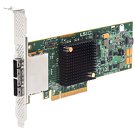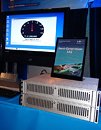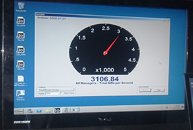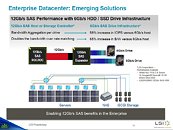Friday, November 18th 2011
LSI Implements SAS 12 Gb/s Interface
LSI corporation is the first to implement new serial-attached SCSI (SAS) 12 Gb/s interface, geared for future generations of storage devices that can make use of that much bandwidth. For now, LSI proposes SAS expander chips that distribute that bandwidth among current-generation storage devices. The company displayed the world's first SATA 12 Gb/s add-on card, which uses PCI-Express 3.0 x8 interface to make sure there's enough system bus bandwidth. This card can connect to up to 44 SAS or SATA devices, and supports up to 2048 SAS addresses. It is backwards compatible with today's 6 Gb/s and 3 Gb/s devices.
By making use of the 12 Gb/s SAS Expander solution paired with 32 current-generation Seagate Savvio 15.3K RPM hard drives, LSI claims 58% increase in IOPS compared to a 6 Gb/s host controller, because of better bandwidth aggregation per drive. There's also a 68% increase in bandwidth yield. The array of 32 hard drives could dole out 3106.84 MB/s on IOMeter, and more significantly, over 1.01 million IOPS. As big as this number seems, it could be an IOMeter bug, because the numbers don't add up. Perhaps it's measuring IOPS from disk caches.
Source:
TheSSDReview
By making use of the 12 Gb/s SAS Expander solution paired with 32 current-generation Seagate Savvio 15.3K RPM hard drives, LSI claims 58% increase in IOPS compared to a 6 Gb/s host controller, because of better bandwidth aggregation per drive. There's also a 68% increase in bandwidth yield. The array of 32 hard drives could dole out 3106.84 MB/s on IOMeter, and more significantly, over 1.01 million IOPS. As big as this number seems, it could be an IOMeter bug, because the numbers don't add up. Perhaps it's measuring IOPS from disk caches.




36 Comments on LSI Implements SAS 12 Gb/s Interface
P.S, the guy on drugs needs reading compherension. You know who I'm referring to. But he seems to like banning people. :D
This arguement was done late at night. That's why I couldn't word it properly at first.
He, as a mod, called me "on drugs" and didn't give credit to anything I said.
Companies wouldn't bother with improving SAS drives if SSD is taking over so much like you are saying. SSD's still have a long way before they enter heavy enterprise environments.
And also how can I be wrong when I experienced it first hand? I guess you like marketing slides more than real life.
Companies that can afford are moving to PCI-E SSD's and especially I/O drives. You didn't seem to have experienced anything;
www.micron.com/products/solid_state_storage/enterprise_pcie_ssd.html
You did exactly what I said you should not, you gave me some theoretical numbers and those are performance numbers. So I'll ask you again, can you give me any numbers after 5 years of constant duty?
I never said they won't move to SSD, they are as we speak but for now only on those areas where you don't need very high reliability.
And who are you to say what have I experienced and what I haven't? And even more funny you link me some marketing crap after that sentence :laugh:
So just to sum it up, give me real world (Not predictions or theoretical stuff) data about SSD's reliabilty in heavy write environment after a longer period of time.
Anyway, I see that you are just trying to save yourself here so I'll just end it here, my last post.
It hasn't been 5 years SSD's became a norm. The first line of SSD with Micron controller started coming out in around 2007, and those were plagued with controller issues. That's why some people are still concerned. They have nothing to do with the enterprise SSD's of today.
To think that SAS HDD's are the only reliable option is laughable at best, really. :rolleyes: I/O drives have unmatched reliablity, more so than a mechanical disk. Google ZeusIOPS... :rolleyes: